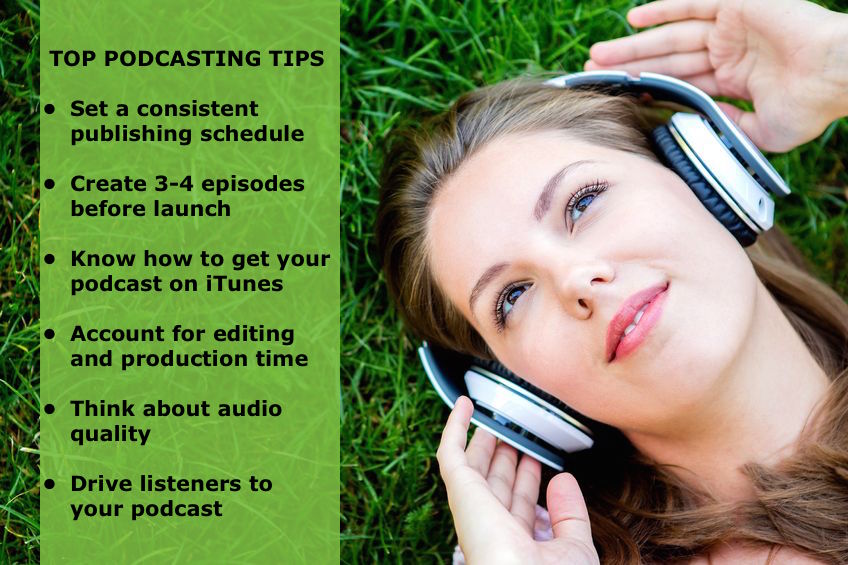10 Tips For Individuals or Organizations Thinking About Launching a Podcast
In today’s post, we’ll share the essential podcasting tips and best practices we’ve learned over the past three years. Hopefully, these tips will help you avoid some of the hurdles and roadblocks that tripped us up as you begin your own podcasting journey.
Why Launch a Podcast?
- Show (and share) your expertise
- Give yourself or your brand a voice (literally)
- Reach new audiences with a different form of content
10 Best Practices Every New Podcaster Needs to Know
Thinking about launching a podcast? Here are 10 best practices learned from three years and 40 episodes of podcasting…
1. Be realistic about time
Creating and maintaining a quality podcast takes TLC. It also takes time—something working professionals definitely need to take into account before launching a podcast. Prepping content, recording, editing, and posting can eat up a whole lot more time than you might think.
Tip: Create a couple of test episodes to get a time baseline; adjust the scope as needed from there to make it workable.
2. Create a consistent publishing schedule
Getting your podcast out there on a regular basis is hugely important to building a listener base. Create a schedule that you can realistically stick to—and then stick to it! Whether that’s monthly, weekly or bi-weekly. Give your listeners something they can rely on.
Tip: Weekly or bi-weekly are the most common podcast frequency choices; try to post on the same day each week.
3. Do a few trial runs first
You’ll be excited to get your podcast out into the world, but do some testing to get your format, style, audio quality, and banter down before unleashing your podcast. Have topics prepared for the first five episodes. Plan on launching with 3-5 finished episodes.
Tip: Your exposure on iTunes will be better if you have multiple episodes for people to listen to at launch when you may be featured in the “New & Notable” section.
4. Invest in quality microphones
Trust us, equipment makes a difference. If you want proof, just listen to episode #1 of our podcast versus episode #40. No matter how great your content, no one wants to listen to a podcast with poor audio quality.
Tip: We invested in a couple of Yeti Blue microphones and it’s made a big difference. Check out this post for other podcast microphone recommendations.
5. Be prepared to edit and add production value
If you want to sound professional, you’ll need to edit. Editing helps you smooth out the wrinkles and create a good flow. You’ll also want to add production value, like intro and outro themes. Now, all this is going to take time—so make sure to plan for that time in your schedule.
Tip: We started out using GarageBand for editing but have since moved to Adobe Audition.
6. Do your homework on iTunes
Know what you have to do to get your podcast on iTunes, Stitcher, or any other sites where you want to publish or promote it. Do some online research. Having your podcast in iTunes is especially essential since it has a large audience of podcast listeners.
Tip: Here’s some info from Apple on prepping your podcast for iTunes.
7. Make sure you’re passionate about your topic
If you’re not talking about something you love on your podcast, it will quickly fall by the wayside. It also won’t spark much listener interest. Have fun with it. Like anything else, your passion and enthusiasm will show through.
Tip: Make sure you have a core theme or focus for your podcast; for example, we talk about a lot of different things on our podcast but they are all tied in some way to “marketing”.
8. Promote, promote, promote
Podcasting is definitely not an “if you build it, they will come” scenario. You have to actively work to drive listeners to each and every episode of your podcast. That means marketing and sharing it the same way you would blog posts or any other online content.
Tip: Social media is a great way to share podcast content; consider holding a contest to encourage your social media followers to check out your podcast and review/rate it on iTunes.
9. Create a website or dedicated Web page for your podcast
Give your podcast a home where people can find episodes. Like any other website you create, make sure it has a strong design and is SEO optimized. Make it easy for people to find and listen to episodes. Along with on-site streaming, provide links to the podcast in iTunes.
Tip: Not quite sure what you want your podcast site/page to look like? Go exploring and check out other podcast sites for inspiration. Here’s our podcast page.
10. Go in with a plan
Make sure you start with a strategy before you ever turn on a mic. Plot out on paper how you will record, edit, publish and promote your podcast. Break it down into specific steps and action items. This will save you a lot of time, effort, and stress in the long run—and give you the best chance at podcasting success.
Tip: Use your determined amount of time required per episode to help you come up with a publishing frequency you can realistically keep up with.
Key Podcasting Takeaways:
- Develop and test your format
- Have a recording and publishing schedule
- Have topics prepared for the first 4-5 episodes before you start
- Know what you have to do to get your podcast on iTunes
- Create a website and decide how you will present new episodes
- Account for editing and production time
- Think about audio quality
- Work to drive listeners to your podcast

ADVERTISEMENT
ADVERTISEMENT








